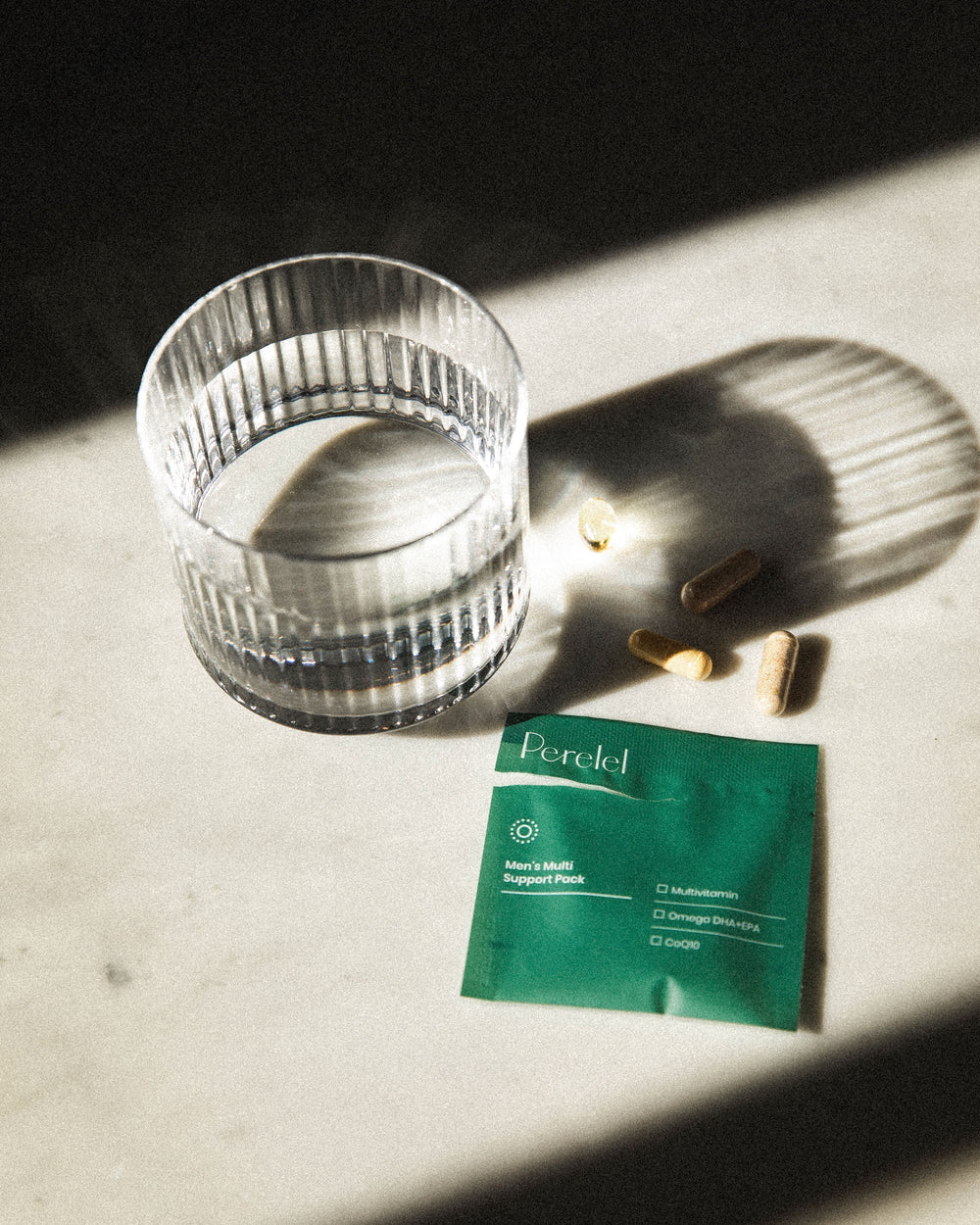For women who are trying to conceive, the first stop on the road to parenthood is often the local pharmacy to pick up prenatal vitamins. Prenatal vitamins help to ensure you’re getting the nutrients you need to support your baby’s development.1
“A prenatal vitamin is designed to help supplement what we’re not getting from our diet,” says Dr. Brian Levine, MD, MS, FACOG, an OB/GYN and reproductive endocrinologist on the Perelel Panel who helped to formulate the Men’s Multi Support Pack.
But can men take prenatal vitamins too?
The short answer is yes. While prenatal vitamins are the norm for women who are trying to conceive, many men don’t realize they can take vitamins to support their own fertility, Dr. Levine says.
“If your wife or partner or girlfriend is taking a prenatal vitamin, you probably should too,” he adds.
However, men and women have different nutritional needs when it comes to fertility—so it’s important to choose a prenatal vitamin specifically designed for men.
Here’s what you need to know when choosing a men’s preconception vitamin.

Is it safe for men to take a women’s prenatal vitamin?
It’s important to stay within the Recommended Dietary Allowances (RDAs) for each vitamin.2 And those recommendations differ for men and women.
For example, women need more iron than men. The RDA for adult men is 8 mg of iron, while women between ages 19 and 50 should get 18 mg—and even more when pregnant or breastfeeding.3
A prenatal vitamin for women will likely include:
- Folate
- Iron
- Choline
- Vitamin D
For men who are planning to start a family, the list of key ingredients is slightly different so a prenatal supplement designed specifically for men is a better bet for supporting male fertility.
“If you’re thinking about having a kid in the future, start today,” Dr. Levine adds. “It takes 65 to 76 days to make sperm, depending on which literature you read. Whatever you do today will improve your quality in three months, and whatever you did three months ago will be how your quality looks today.”
$42.70
Shop the Article:

Men’s Multi Support Pack
/ Month
Shop Now
What vitamins should men take for daily use or preconception?
There are a few key nutrients that are especially beneficial for male fertility. Each of these can be found in the Men’s Multi Support Pack.
A well-rounded multivitamin
“Having a child is like running a marathon that just doesn’t end,” Dr. Levine says. “It’s exhausting. It’s emotionally rewarding. It’s a huge achievement.” A multivitamin provides full-spectrum nutrition and immunity support, plus the energy you’ll need to take on parenthood.
OB/GYNs recommend starting a prenatal vitamin regimen 6 months before you’re ready to start trying to conceive.Doctor Tip!
Similar to a women’s prenatal vitamin, Dr. Levine adds, the most important ingredient in the Men’s Multi Support Pack is folate. For women, folate supports your baby’s brain development and helps to protect against neural tube defects. For men, folate can support for sperm function and DNA synthesis.4
Prenatal vitamins often include folic acid, which is a synthetic form of folate.5 However, Perelel uses methylated folate, which is a more absorbable, bioavailable form.
Omega DHA + EPA
The omega-3 fatty acids DHA (Docosahexaenoic Acid) and EPA (Eicosapentaenoic Acid) can benefit your heart, brain, immune system, and inflammatory response. When you’re trying to conceive, omega-3 fatty acids may help support sperm count, motility and morphology.6 The Men’s Multi Support Pack includes the recommended amount of each “in an easy to metabolize form,” Dr. Levine says.
CoQ10
Coenzyme Q10 is an antioxidant produced by the body that's important for cell growth and maintenance, and it may also benefit heart health and physical performance.7 Research suggests CoQ10 can also improve semen quality, and especially sperm motility.8
“CoQ10 is a super powerful anti-inflammatory agent,” Dr. Levine says. “I think we’re going to start seeing more CoQ10 integrated into our diet and our daily routines.”
How do men’s prenatal vitamins help with fertility?
The vitamins and minerals in a men’s preconception supplement can improve sperm quality and overall health. Think of a men’s prenatal vitamin as a life preserver, Dr. Levine says. You wouldn’t get on a boat if you expected it to sink, but you’d also make sure there’s a life preserver on board just in case.
Likewise, a prenatal vitamin is meant to support a healthy diet and fill in the gaps on those days when your nutrition was less-than-ideal.
But—perhaps just as importantly—they help men take an active role in the fertility journey. Fertility is often framed as a women’s health issue, Dr. Levine notes. But when he sees patients struggling to get pregnant, it’s closer to a 50/50 chance that the man’s fertility is a factor.
“I’ve seen women go through painful exams, blood tests, ultrasounds, and invasive testing only to learn that their husband has suboptimal sperm that could be fixed with a simple vitamin for three months,” Dr. Levine says.
Taking a men’s prenatal supplement helps to reinforce the understanding for both partners that pregnancy is a shared goal. “That’s why this dialogue is so important,” Dr. Levine says. “We have to stop saying ‘whose fault is it?’ and say ‘how do we move together so we both make sure we’re in the best place possible?’”
What else can men do to support their fertility?
Along with taking prenatal vitamins, there are a few additional steps men can take to play an active role in the fertility process.
- Maintain a healthy weight.
Gaining excess weight has been linked with inflammation,9 which can affect sperm quality, Dr. Levine says. A balanced diet and active lifestyle can help you set yourself up for success.
- Exercise.
“Exercise is so important for men,” Dr. Levine says. “And it needs to be varied exercise—don’t just be the elliptical guy or the lifting guy.” Aim for a mix of steady-state cardio, high-intensity intervals, and resistance training.
Regular exercise can play a role in helping to maintain a healthy weight, of course, but it can also benefit male fertility in other ways.
“Sitting and not being active will increase the temperature of the testicles and lower your sperm count,” Dr. Levine says. Exercise can also increase testosterone, he adds.
- Manage stress.
“Easy to say, and so hard to do,” Dr. Levine says. Psychological stress can impact male fertility,10 he adds, so it’s important to prioritize your mental wellbeing as much as possible.
- Don’t smoke.
Smoking causes oxidative stress, which has a significant effect on fertility, specifically sperm count and normal morphology of sperm. “It’s counterproductive to getting pregnant,” Dr. Levine says.
- Avoid toxins.
Sperm are particularly sensitive to environmental toxins, Dr. Levine says. “When in doubt, protect yourself—think about the toxins you’re being exposed to, and think about some actions you can do to protect your most precious opportunity.” Heavy metals cause toxicity by impacting testicular function, spermatogenesis and sperm processing. Of greatest concern are heavy metals like cadmium, lead, mercury, and arsenic.

theFolio in Your Inbox
Sign up to receive doctor-backed, stage-specific content in your inbox each week.
Go 50/50 with your partner now with the Men's Multi Support Pack that can be bundled to Perelel's Conception Support Pack for women. Read next: 6 tips to boost male fertility.
References:
- Mayo Clinic; Prenatal vitamins: Why they matter, how to choose; May 2020
- Medline Plus: Vitamins
- National Institutes of Health; Iron: Fact Sheet for Health Professionals
- Emmanuelle Mathieu d’Argent et al; High-Dose Supplementation of Folic Acid in Infertile Men Improves IVF-ICSI Outcomes: A Randomized Controlled Trial; May 2021
- Centers for Disease Control and Prevention; General Information about NTDs, Folic Acid, and Folate
- Mohammad Reza Safarinejad and Shiva Safarinejad; The roles of omega-3 and omega-6 fatty acids in idiopathic male infertility; July 2012
- Mayo Clinic; Coenzyme Q10
- Gianmaria Salvio et al; Coenzyme Q10 and Male Infertility: A Systematic Review; June 2021
- Mohammed S Ellulu et al; Obesity and inflammation: the linking mechanism and the complications; June 2017
- Vinod H Nargund; Effects of psychological stress on male fertility; July 2015
This article is for informational purposes only. It is not, nor is it intended to be, a substitute for professional medical advice, diagnosis, or treatment and we recommend that you always consult with your healthcare provider. To the extent that this article features the advice of physicians or medical practitioners, the views expressed are the views of the cited expert and do not necessarily represent the views of Perelel.






















